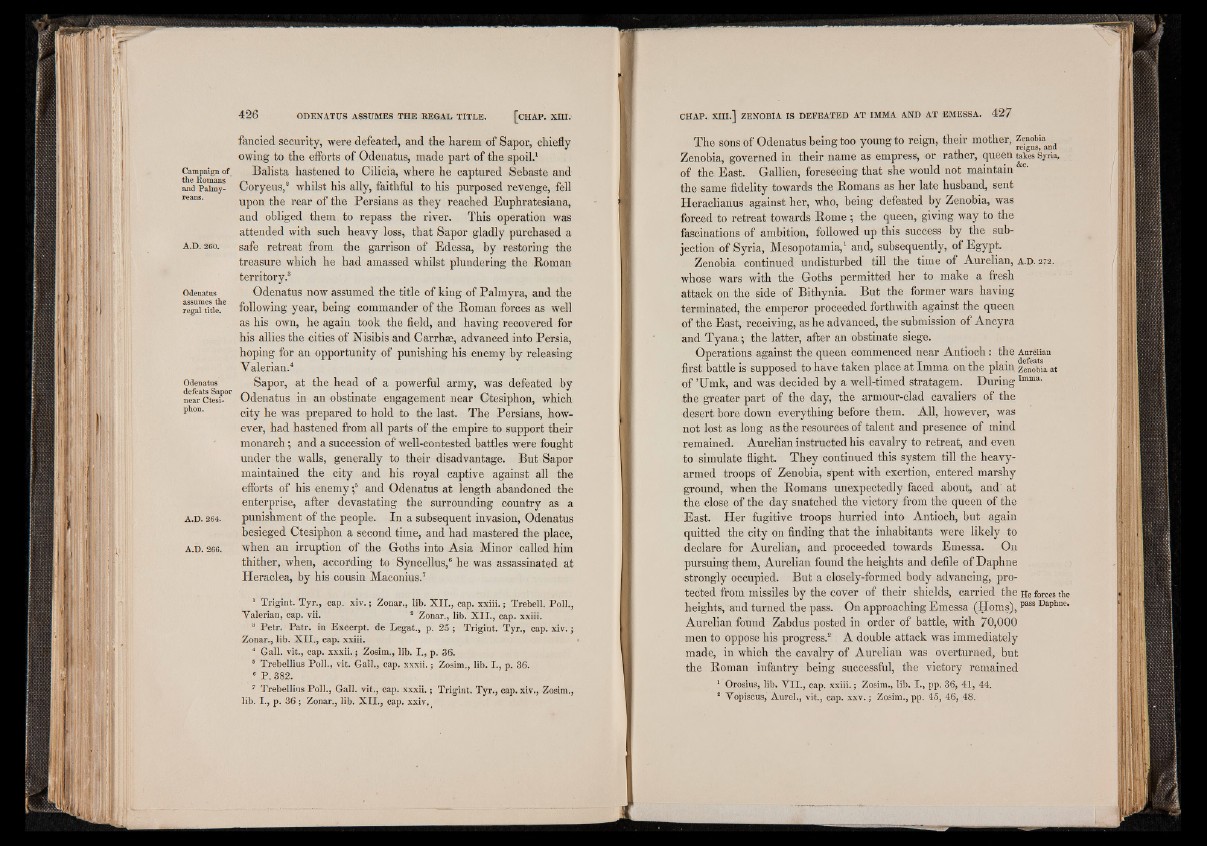
Campaign of
the Romans
and Palmy-
reans.
A.D. 260.
Odenatus
assumes the
regal title.
Odenatus
defeats Sapor
near Ctesi-
phon.
A.D. 264.
A.D. 266.
fancied security, were defeated, and the harem of Sapor, chiefly
owing to the efforts of Odenatus, made part of the spoil.1
Balista hastened to Cilicia, where he captured Sebaste and
Coryeus,2 whilst his ally, faithful to his purposed revenge, fell
upon the rear of the Persians as they reached Euphratesiana,
and obliged them to repass the river. This operation was
attended with such heavy loss, that Sapor gladly purchased a
safe retreat from the garrison of Edessa, by restoring the
treasure which he had amassed whilst plundering the Roman
territory.3
Odenatus now assumed the title of king of Palmyra, and the
following year, being commander of the Roman forces as well
as his own, he again took the field, and having recovered for
his allies the cities of Nisibis and Carrhee, advanced into Persia,
hoping for an opportunity of punishing his enemy by releasing
Valerian.4
Sapor, at the head of a powerful army, was defeated by
Odenatus in an obstinate engagement near Ctesiphon, which
city he was prepared to hold to the last. The Persians, however,
had hastened from all parts of the empire to support their
monarch; and a succession of well-contested battles were fought
under the walls, generally to their disadvantage. But Sapor
maintained the city and his royal captive against all the
efforts of his enemy ;5 and Odenatus at length abandoned the
enterprise, after devastating the surrounding country as a
punishment of the people. In a subsequent invasion, Odenatus
besieged Ctesiphon a second time, and had mastered the place,
when an irruption of the Goths into Asia Minor called him
thither, when, according to Syncellus,6 he was assassinated at
Heraclea, by his cousin Maconius.7
1 Trigint. Tyr., cap. x iv .; Zonar., lib. X I I ., cap. x x iii.; Trebell. Poll.,
Valerian, cap. vii. * Zonar., lib. X I I ., cap. xxiii.
8 Pe tr. P a tr. in Excerpt, de Legat., p. 25 ; Trigint. Tyr., cap. x iv .;
Zonar., lib. X I I ., cap. xxiii.
4 Gall, vit., cap. x x x ii.; Zosim., lib. I., p. 36.
5 Trebellius Poll., vit. Gall., cap. xxxii.; Zosim., lib. I., p. 36.
• P . 382.
7 Trebellius Poll., Gall, vit., cap. xxxii.; Trigint. Tyr., cap. xiv., Zosim.,
lib. I., p. 36 ; Zonar., lib. X I I ., cap. xxiv.
The sons of Odenatus being too young to reign, their mother, Zenobia^
Zenobia, governed in their name as empress, or rather, queen takes Syria,
of the East. Gallien, foreseeing that she would not maintain
the same fidelity towards the Romans as her late husband, sent
Heraclianus against her, who, being defeated by Zenobia, was
forced to retreat towards Rome ; the queen, giving way to the
fascinations of ambition, followed up this success by the subjection
of Syria, Mesopotamia,1 and, subsequently, of Egypt.
Zenobia continued undisturbed till the time of Aurelian, a .d . 272.
whose wars with the Goths permitted her to make a fresh
attack on the side of Bithynia. But the former wars having
terminated, the emperor proceeded forthwith against the queen
of the East, receiving, as he advanced, the submission of Ancyra
and Tyana; the latter, after an obstinate siege.
Operations against the queen commenced near Antioch: the Aareiian
first battle is supposed to have taken place at Imma on the plain zenobia at
of ’Umk, and was decided by a well-timed stratagem. During Imma-
the greater part of the day, the armour-clad cavaliers of the
desert bore down everything before them. All, however, was
not lost as long as the resources of talent and presence of mind
remained. Aurelian instructed his cavalry to retreat, and even
to simulate flight. They continued this system till the heavyarmed
troops of Zenobia, spent with exertion, entered marshy
ground, when the Romans unexpectedly faced about, and at
the close of the day snatched the victory from the queen of the
East. Her fugitive troops hurried into Antioch, but again
quitted the city on finding that the inhabitants were likely to
declare for Aurelian, and proceeded towards Emessa. On
pursuing them, Aurelian found the heights and defile of Daphne
strongly occupied. But a closely-formed body advancing, protected
from missiles by the cover of their shields, carried the He forces the
heights, and turned the pass. On approaching Emessa (Horns),pass Daphne‘
Aurelian found Zabdus posted in order of battle, with 70,000
men to oppose his progress.2 A double attack was immediately
made, in which the cavalry of Aurelian was overturned, but
the Roman infantry being successful, the victory remained
1 Orosins, lib. V I I ., cap. xxiii.; Zosim., lib. I., pp. 36, 41, 44.
s Vopiscus, Aurel., vit., cap. x x v .; Zosim., pp. 45, 46, 48.